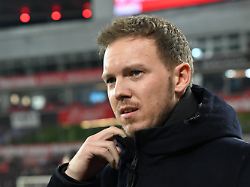He committed suicide
Julian Nagelsmann emotional: The father was a secret agent
February 23, 2024, 2:09 p.m
Julian Nagelsmann was just 20 years old when his father took his own life. He doesn’t leave a farewell letter, which feels “really shit” for the family, as the national coach says. He also reveals: His father was in the BND – and not even his grandfather knew about it.
Julian Nagelsmann takes on great responsibility in his job early on; he is the youngest Bundesliga coach there has ever been. At the age of 36, he has now reached the highest German coaching position as a national coach. It is also a stroke of fate that shaped him early on and burdened him with personal responsibility: his father took his own life when Nagelsmann was just 20 years old.
What he is now telling for the first time: His father worked for the Federal Intelligence Service. “I’m not allowed to say anything more about it. And I don’t even know exactly what he did. In any case, he wasn’t in the administration,” he tells “Spiegel”. He only found out about it when he was 15 or 16 years old. He previously believed that his father was a professional soldier. “Even my grandfather believed his son was a soldier.”
His father never said much about his job, but “often said that it was all too much for him. There was no sharing of worries in his job. In the end it put a lot of strain on him.”
The suicide still concerns Nagelsmann today. “I think back to that day often,” says the 36-year-old and explains how he found out about the news. “I was on a coaching course in Oberhaching near Munich and got my C license there. And suddenly the course leader said that I should please go out.” The next moment he stood in front of his father-in-law at the time, “who told me that my dad had killed himself.”
This put a strain on the family: “My dad didn’t leave a suicide note, there was no explanation. It feels really bad for the family, but it helped me to know that he really wanted to die and it wasn’t a cry for help or a cry for help Signal went. I think I have to respect such a decision.”
“The worst thing in life…”
His father was “courageous,” “he had to make decisions again and again at work, knowing that the whole plan could go awry,” said Nagelsmann, who recognizes some characteristics in himself: “I think I have took over a lot from him.” From this he learned: “The worst thing in life is when you don’t make decisions.” He also conveys this to his players. “I believe that I can appear authentically in such moments because I have experienced a lot in my life.”
The time after the loss shaped him. “I was in my early twenties and suddenly had to take care of the family and sort out all the insurance. Everyday things that you don’t really give a thought to at that age,” said Nagelsmann. “I had to make serious decisions, also to relieve my mother, who suddenly lived in a big house without her partner. With all her memories.” Such decisions have a different dimension than questions about “whether one or the other striker will play from the start.” He grew up faster.
